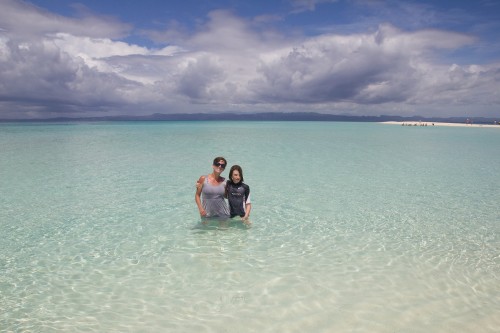Theodora Sutcliffe of Escape Artistes
Hometown: London
Quote: “Leaving is the hardest part. Everything else is easy.”
How long were you on the road?
Four years.
Where did you go?
China, Mongolia, Nepal, Thailand, Malaysia, Singapore, Laos, Vietnam, Timor Leste, Indonesia, Cambodia, The Philippines, Egypt, Jordan, Lebanon, Israel/Palestine, Turkey, England, The Netherlands, Italy, Greece, Bulgaria, France.
What was your job or source of travel funding for this journey?
The first year was funded by proceeds from a house sale. After that, I worked freelance as a writer — copywriter, journalist, blogger and content writer — and I’m now lucky enough to be able to sell the occasional photo.
Did you work or volunteer on the road?
I’m lucky enough to be able to earn money remotely, so that’s what I did. I’d worked as a journalist in the food and drink sector before I left, but I’m now fortunate enough to do a lot of travel writing, including writing about diving, which I love. That’s sprung, directly or indirectly, almost entirely from the blog.
Of all the places you visited, which was your favorite?
Oh, big question! I’d have to go with Indonesia, as that’s where we’ve chosen to settle: with all the diversity across 17,000 islands, it’s impossible to get bored, and it’s a world class diving destination.
Was there a place that was your least favorite, or most disappointing, or most challenging?
I found Vietnam really difficult on our first encounter: I was acutely sensitive to “scams” in the way many new travellers are — then returned a second time and loved it. I suspect I’d have found China difficult in the same way if we’d visited early in our journey.
Which travel gear proved most useful? Least useful?
We’re not really gear people. That said, Zac’s dad bought him a Deuter Fox 30 backpack which has lasted well over three years and shows no sign of dying. Least useful?
What are the rewards of the vagabonding lifestyle?
Freedom! The chance to stay when you like a place, move on when you don’t, and the financial freedom of not being tied into a home base with all the sunk costs that entails.
What are the challenges and sacrifices of the vagabonding lifestyle?
The reason that we’ve stopped is that Zac wanted a fixed circle of friends and regular schooling — friendships made on the road are different from friendships made in a neighbourhood.
What lessons did you learn on the road?
People are fundamentally good and kind.
How did your personal definition of “vagabonding” develop over the course of the trip?
The longer we travelled, the longer our stops became — and I think that’s typical of most longterm travellers. By our fourth year I was counting a stop as long as four months as “slow travel”.
If there was one thing you could have told yourself before the trip, what would it be?
Make sure you get plenty of pictures of the two of you together: you’ll value them far more than landscapes, and you’ll never get those years back.
Any advice or tips for someone hoping to embark on a similar adventure?
Stop planning, stop worrying and just go. Leaving is the hardest part. Everything else is easy.
When and where do you think you’ll take your next long-term journey?
That depends what you mean by longterm. If Zac spends some of this summer with his father, I’ll probably do a few weeks solo, either overland in India or diving Indonesia. If we’re talking about six months plus, that’ll need to wait until Zac’s started college, and that’ll probably be Africa, a region in which he has no interest.
Read more about Theodora & Zac on their blog, Escape Artistes.
Are you a Vagabonding reader planning, in the middle of, or returning from a journey? Would you like your travel blog or website to be featured on Vagabonding Case Studies? If so, drop us a line at casestudies@vagabonding.net and tell us a little about yourself.
Image: Nikos Koutoulas (flickr)

